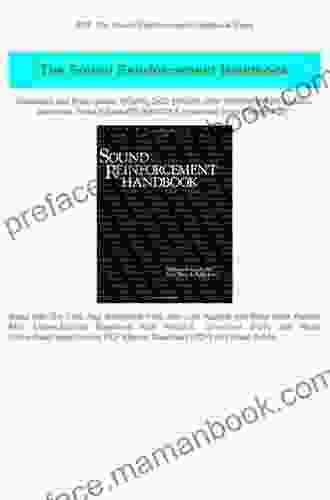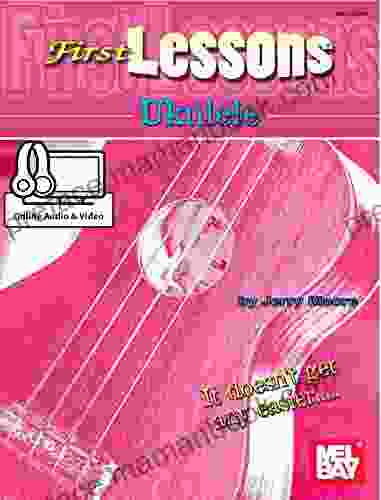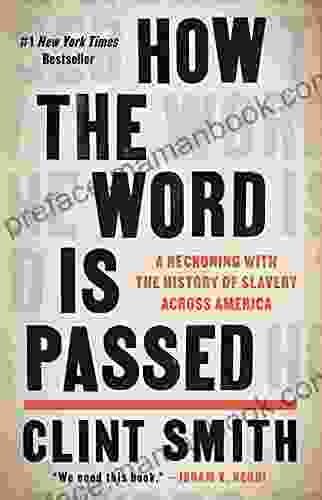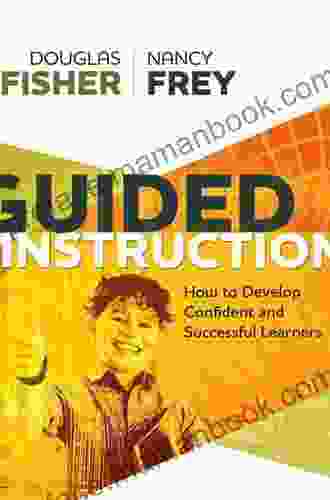Reckoning with the History of Slavery Across America: A Long Journey Towards Reconciliation

4.8 out of 5
| Language | : | English |
| File size | : | 975 KB |
| Text-to-Speech | : | Enabled |
| Screen Reader | : | Supported |
| Enhanced typesetting | : | Enabled |
| X-Ray | : | Enabled |
| Word Wise | : | Enabled |
| Print length | : | 353 pages |
The history of slavery in America is a dark and painful chapter that has had a profound impact on the nation's society, culture, and politics. From the arrival of the first enslaved Africans in the early 1600s to the abolition of slavery in 1865, the institution of slavery shaped the lives of millions of people and left a lasting legacy that continues to resonate today.
The Transatlantic Slave Trade
The transatlantic slave trade was a brutal system that forcibly transported millions of Africans to the Americas over the course of centuries. Beginning in the 16th century, European powers established trading posts along the coast of West Africa and began to enslave Africans for labor on plantations in the Caribbean and the Americas.
The conditions on slave ships were horrific. Africans were packed into cramped and unsanitary quarters, often dying from disease or malnutrition. Many were branded or whipped as a form of punishment. The journey across the Atlantic Ocean could take months, and it is estimated that up to 15% of Africans died during the passage.
Slavery in the United States
The first enslaved Africans arrived in the English colonies in North America in 1619. Over the next two centuries, slavery became deeply entrenched in the Southern colonies, where it was used to support a plantation-based economy. By the time of the American Revolution, there were over half a million enslaved Africans in the United States.
Slavery in the United States was a system of racial oppression. Enslaved Africans were denied basic rights and were subjected to brutal treatment. They were forced to work long hours in the fields, often under the threat of violence. They were separated from their families and were not allowed to learn to read or write.
Emancipation and Reconstruction
The American Civil War (1861-1865) was fought over the issue of slavery. In 1863, President Abraham Lincoln issued the Emancipation Proclamation, which declared that all enslaved people in Confederate-held territory were free. The war ended with the Confederacy's defeat in 1865, and slavery was abolished throughout the United States.
The period after the Civil War, known as Reconstruction, was a time of great change for the United States. The 13th Amendment to the Constitution abolished slavery, and the 14th and 15th Amendments granted citizenship and voting rights to African Americans. However, Reconstruction was also a time of great violence and resistance from white Southerners who were unwilling to accept the end of slavery.
Jim Crow Laws and the Civil Rights Movement
In the late 19th century, white Southerners began to enact a series of laws known as Jim Crow laws. These laws were designed to segregate African Americans from whites in all aspects of life, including education, employment, housing, and public accommodations. Jim Crow laws legalized discrimination against African Americans and made it difficult for them to exercise their rights as citizens.
The Civil Rights Movement of the 1950s and 1960s was a nonviolent social movement that fought to end Jim Crow laws and achieve racial equality. Led by such figures as Martin Luther King Jr., Rosa Parks, and Malcolm X, the Civil Rights Movement used protests, boycotts, and civil disobedience to challenge segregation and discrimination. The movement's successes included the passage of the Civil Rights Act of 1964 and the Voting Rights Act of 1965, which outlawed discrimination based on race and guaranteed the right to vote for all Americans.
Reconciliation and Healing
The legacy of slavery continues to shape American society today. The racial disparities that exist in education, employment, housing, and criminal justice can be traced back to the history of slavery and discrimination.
In recent years, there has been a growing movement to reckon with the history of slavery and its lasting legacy. This movement has included efforts to create memorials and museums to commemorate the victims of slavery, to provide reparations to descendants of enslaved people, and to address the systemic racism that continues to disadvantage African Americans.
Reconciliation and healing from the history of slavery is a complex and ongoing process. It requires a commitment from all Americans to confront the past, to acknowledge the pain and suffering that slavery has caused, and to work together to create a more just and equitable society.
The history of slavery in America is a long and painful story, but it is also a story of resilience and resistance. The enslaved Africans who endured the horrors of the transatlantic slave trade and the brutality of slavery in the United States fought for their freedom and helped to shape the course of American history. The Civil Rights Movement of the 1950s and 1960s was a major step forward in the fight for racial justice, but there is still much work to be done to address the legacy of slavery and to create a more just and equitable society.
Reckoning with the history of slavery is a critical step towards reconciliation and healing. By confronting the past, we can learn from our mistakes and work to build a better future for all Americans.
Additional Resources
- National Museum of African American History and Culture: Slavery
- Equal Justice Initiative: The Legacy of Racial Injustice
- NAACP: History of Slavery
- Southern Poverty Law Center: Racial Justice
- NPR: The Case for Reparations
4.8 out of 5
| Language | : | English |
| File size | : | 975 KB |
| Text-to-Speech | : | Enabled |
| Screen Reader | : | Supported |
| Enhanced typesetting | : | Enabled |
| X-Ray | : | Enabled |
| Word Wise | : | Enabled |
| Print length | : | 353 pages |
Do you want to contribute by writing guest posts on this blog?
Please contact us and send us a resume of previous articles that you have written.
 Top Book
Top Book Novel
Novel Fiction
Fiction Nonfiction
Nonfiction Literature
Literature Paperback
Paperback Hardcover
Hardcover E-book
E-book Audiobook
Audiobook Bestseller
Bestseller Classic
Classic Mystery
Mystery Thriller
Thriller Romance
Romance Fantasy
Fantasy Science Fiction
Science Fiction Biography
Biography Memoir
Memoir Autobiography
Autobiography Poetry
Poetry Drama
Drama Historical Fiction
Historical Fiction Self-help
Self-help Young Adult
Young Adult Childrens Books
Childrens Books Graphic Novel
Graphic Novel Anthology
Anthology Series
Series Encyclopedia
Encyclopedia Reference
Reference Guidebook
Guidebook Textbook
Textbook Workbook
Workbook Journal
Journal Diary
Diary Manuscript
Manuscript Folio
Folio Pulp Fiction
Pulp Fiction Short Stories
Short Stories Fairy Tales
Fairy Tales Fables
Fables Mythology
Mythology Philosophy
Philosophy Religion
Religion Spirituality
Spirituality Essays
Essays Critique
Critique Commentary
Commentary Glossary
Glossary Bibliography
Bibliography Index
Index Table of Contents
Table of Contents Preface
Preface Introduction
Introduction Foreword
Foreword Afterword
Afterword Appendices
Appendices Annotations
Annotations Footnotes
Footnotes Epilogue
Epilogue Prologue
Prologue Marg Ruttan
Marg Ruttan Lydia St Giles
Lydia St Giles Tiffany Brice Ferguson
Tiffany Brice Ferguson Curwen Best
Curwen Best Wayne W Dyer
Wayne W Dyer Joanna Mazurkiewicz
Joanna Mazurkiewicz Dale Marie Bryan
Dale Marie Bryan George Motz
George Motz J J Zerr
J J Zerr Jon Messenger
Jon Messenger Peter Redgrove
Peter Redgrove Phil Zabriskie
Phil Zabriskie Mark Lawrence
Mark Lawrence Ellen Kottler
Ellen Kottler Kate E Reynolds
Kate E Reynolds Christina Ortmeier Hooper
Christina Ortmeier Hooper Mathieu Boumal
Mathieu Boumal Blue Skeleton
Blue Skeleton Carlos Coronel
Carlos Coronel Linnea Tanner
Linnea Tanner
Light bulbAdvertise smarter! Our strategic ad space ensures maximum exposure. Reserve your spot today!

 Dylan HayesIoT Based Greenhouse Monitoring and Control System: A Comprehensive Guide for...
Dylan HayesIoT Based Greenhouse Monitoring and Control System: A Comprehensive Guide for... Christopher WoodsFollow ·19.5k
Christopher WoodsFollow ·19.5k Bernard PowellFollow ·14.1k
Bernard PowellFollow ·14.1k Carl WalkerFollow ·4k
Carl WalkerFollow ·4k Roald DahlFollow ·16.8k
Roald DahlFollow ·16.8k Pablo NerudaFollow ·5.4k
Pablo NerudaFollow ·5.4k Richard SimmonsFollow ·10.2k
Richard SimmonsFollow ·10.2k Lucas ReedFollow ·18.9k
Lucas ReedFollow ·18.9k Kenzaburō ŌeFollow ·9.2k
Kenzaburō ŌeFollow ·9.2k

 Vincent Mitchell
Vincent MitchellUnveiling the Enchanting Tale of Plant Reproduction: A...
Plants, the silent yet vibrant...

 Sam Carter
Sam CarterDelve into the Enigmatic World of "Relative Murder: A...
In the realm of mystery and suspense, the...

 Richard Simmons
Richard SimmonsThe Sound Reinforcement Handbook: A Comprehensive Guide...
In the realm of live sound engineering, The...

 Leo Tolstoy
Leo TolstoyEnter the New Era of Cyberwar: Unmasking the Kremlin's...
`` Prologue: The Digital...

 Brenton Cox
Brenton CoxFirst Lessons Ukulele Bridget Baker: A Comprehensive...
Embarking on a musical journey with the...
4.8 out of 5
| Language | : | English |
| File size | : | 975 KB |
| Text-to-Speech | : | Enabled |
| Screen Reader | : | Supported |
| Enhanced typesetting | : | Enabled |
| X-Ray | : | Enabled |
| Word Wise | : | Enabled |
| Print length | : | 353 pages |












